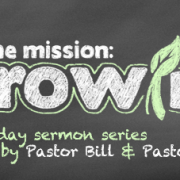The ‘One Another’
Nehemiah 4:19
“Then I said to the nobles, the rulers, and the rest of the people, “The work is great and extensive, and we are separated far from one another on the wall.”
There is the very tangible reality in our daily lives that we are separated far from one another “on the wall”.
There is no doubt that the “work” we are involved in as the Body of Christ is vast and extensive from our point of view. As we look at the “walls” that lie in disrepair and comprehend that its “breaches are many” (Isaiah 22:9), we begin to understand the scope of all that has been done, and begin to understand the reach that still has to be accomplished in our own communities, to the ends of the globe.
What greater thing is there than pouring our very lives that have been redeemed from the slimy pit and have now been washed clean, purged from the stains of our guilty consciences and shot-out lives, into the great and eternal “work” that we have been called to and given gifts by His Spirit which enable us to engage ourselves in this work effectively and profitably for the renown of Jesus’ name.
There are those that each of us know and love and care for in the Body of Christ that are fighting and laboring and toiling, expending spiritual and physical blood, sweat, and tears in this “work”. They are the ones that fill the seats on Wednesdays and Sundays, falling asleep, nodding off during our sermons, not making it to the discipleship classes, the home fellowship or mid-week study all the time, “‘cuz I’m just plumb wore out”.
They are the ones who are directly involved in the “front lines” work of the ministry. They are the ones forging ahead day in and day out into the vast hordes of men and women, young and old who don’t believe. And it is at those moments that we feel so separate from one another in the work that God has set before us to do.
And here in Nehemiah 4:16 we see the position of the leaders in the “impossible” work in Jerusalem…namely repairing the breaches, rebuilding the wall. The leaders are positioned squarely behind the “frontline”. Yes, they are also directly involved in the work themselves, fighting, laboring and toiling alongside.
But they are also functioning “behind the scenes”, watching, directing, re-directing, encouraging, equipping, etc.
With this picture in mind, one thought stands out. There is the necessity that we must teach, by our lives and by our words, that in the work of the Lord and in the service of the Lord, in desiring to accomplish the task that is before us, there is a needed balance, with which we will be able to be most effective in our watching and in our working.
We, as pastors, have been separated from “waiting on tables”, so to speak, and strive to be constant in our giving of ourselves, our entire lives, to the ministry of the word and to prayer. Our desire, our goal, our calling, if you will, is to excel in being the leaders that God has gifted us to be so that you might be the best equipped, as you each are laboring and toiling on the front lines, rebuilding the walls.
It is the Body working together, every part functioning in the role and giftings that the Lord has given each of us.
Ephesians 4:11-16
We have been given the grand opportunity to glorify God in coming alongside one another in this Great and Extensive work that He has called us to, gifted us for, and given leaders in His Body as He has seen fit to equip us for the work He has prepared beforehand for us to walk in.
1 Corinthians 12:27
“Now you are the body of Christ (corporately) , and members individually.”










